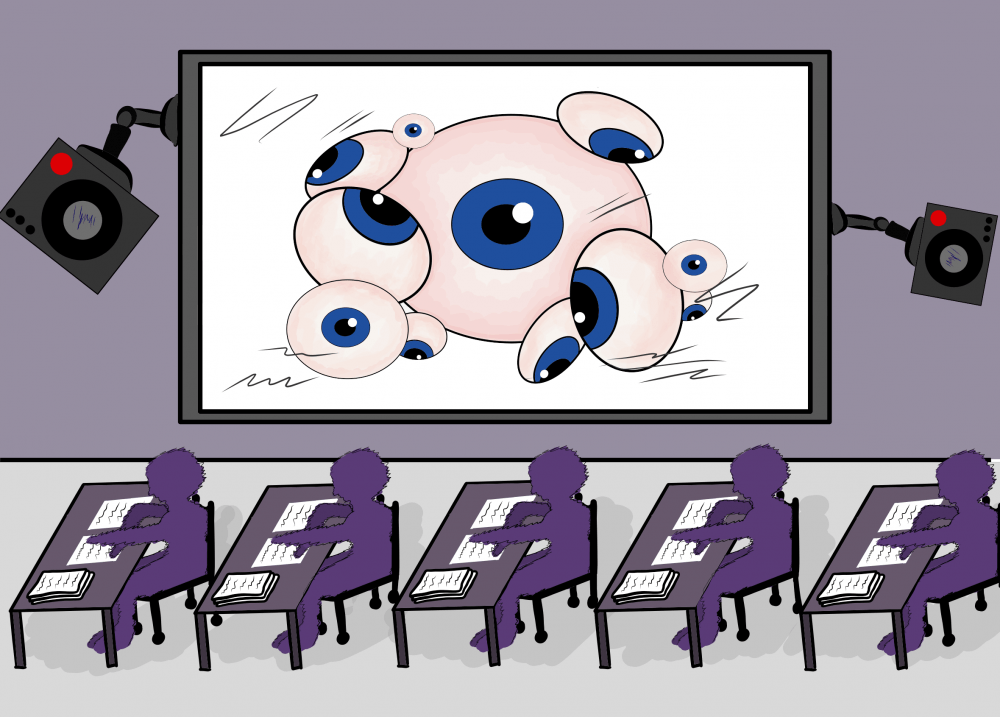When the first day of spring break unfolded, I stepped into the Phoenix Sky Harbor Airport with a positive attitude I usually find hard to muster in airports.
As I hurried through the masses of people, an advertisement caught my eye. "Protect yourself from cyber attacks," the banner above me read, accompanied by a man's face from the nose down wearing a suspicious smirk. He was sitting before a laptop, his fingers poised to commit a nefarious attack on an unsuspecting victim's cyberspace.
Ever since I saw that banner, the issues of cybersecurity and surveillance have weighed heavily on my mind. From alleged Russian involvement in the 2016 election to Donald Trump accusing Barack Obama of wiretapping the White House, worries about third-party surveillance of private information are ubiquitous in our modern political climate.
Terrible! Just found out that Obama had my "wires tapped" in Trump Tower just before the victory. Nothing found. This is McCarthyism!
— Donald J. Trump (@realDonaldTrump) March 4, 2017
The importance of student awareness about surveillance was emphasized by last week's event on campus. On March 16, Sylvia Tomasch gave a speech titled "Speaking of/under Surveillance," informing ASU students about the power and history of surveillance.
While the political issues of hacking, compromised cybersecurity and illegal surveillance may seem far away, the threat of being under surveillance is as close as your laptop, mobile phone or other device.
Edward Snowden shook the world when he leaked documents from the National Security Agency that revealed top-secret surveillance of millions of people around the world. Since then, he has influenced the passing of the USA Freedom Act, a law that shut down a number of controversial NSA programs, including one that collected phone call information from thousands of Americans.
Snowden's leaks also shaped public opinion of government trustworthiness. Yet while the NSA's misdeeds were revealed, the government is far from the only threat to your cyber security. The increasing influence of the internet brought with it the emergence of hackers.
Third parties can monitor our social media sites and web history to bombard us with ads specifically catered to our interests. In a world where much of our information is vulnerable to third-party surveillance, it's no wonder many people are on edge.
However, there are ways in which you can protect yourself against being watched by third parties.
"It is also worth mentioning here that those who use the internet oftentimes have an overstated sense/expectation of privacy," said Kim Jones, director of ASU's Cybersecurity Education Consortium, in an email. "The internet is a public domain, and many of its resources are made available to users free of charge. In placing items on the internet, you are surrendering many of your rights to privacy."
How can ASU students who are worried about surveillance take action to protect themselves? According to Jones, there are three steps you can take.
First off, manage your digital footprint. "Don’t stop speaking out on issues that are important to you, but if you put yourself out there on issues, be cognizant of all data and information that you make available about yourself online," Jones said.
Secondly, cover device cameras to protect yourself from the dangers of webcam hacking.
Last but not least, update all software on all devices religiously. Updating will strengthen your existing software and eliminate potential avenues hackers could find to access your devices and turn them against you.
In a world where compromised privacy is a hot-button issue and politicians' careers can be molded by hackers, ensuring your own cybersecurity is a critical task. But it doesn't have to be a difficult one. Sometimes all it takes is a well-placed sticker over your laptop's camera to blot out the gaze of a potential peeping Tom.
Reach the reporter at sosulli2@asu.edu or follow @serenaeosully on Twitter.
Editor’s note: The opinions presented in this column are the author’s and do not imply any endorsement from The State Press or its editors.
Want to join the conversation? Send an email to opiniondesk.statepress@gmail.com. Keep letters under 300 words and be sure to include your university affiliation. Anonymity will not be granted.
Like The State Press on Facebook and follow @statepress on Twitter.




